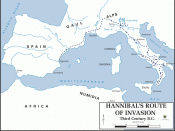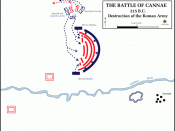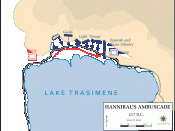The modern world was profoundly shaped by the events of ancient Europe. A very notable event, the Punic Wars, signified the demise of a civilization. Motivated by economic and cultural tensions in the Mediterranean, Rome ended the last reign of Phoenician culture by defeating Carthage in the Punic Wars. Although Rome won the war, Carthage was not easy to defeat; they fought the Romans with might and proved their capabilities by winning many battles.
The Battle of Cannae was an important part of the Second Punic War. Upon the banks of the Aufidus River (now known as the Ofanto), near the town of Cannae, the Romans suffered their greatest defeat. The famed Carthaginian, General Hannibal Barca, devastated the Roman army on the 2nd of August, 216 B.C.E. in accordance with the Roman calendar. The exact location remains uncertain even now, though it is generally accepted that the battle occurred along the riverbank near Cannae.
According to Harold Lamb, Cannae was a "half-ruined stone village" (134). Situated in the fertile region of Campania, it was home to several Roman granaries. As Bradford said, Cannae is sited on "a hill that stood up abruptly out of an undistinguished plain through which the Aufidus flowed in a serpentine fashion" (108). After a brief skirmish with Roman troops, Hannibal captured Cannae. By capturing Cannae, Hannibal deprived the Roman army of needed rations and secured food for his own army.
The senate of Rome as well the population was determined to battle with the Carthaginian general. Rome was seething after the Carthaginians massacred fifteen thousand soldiers of their army at the Battle of Lake Trasimene. The prestige of Rome was at stake. If Hannibal was permitted to ravage the country, other cities would deny Roman supremacy and join the Carthaginians.
As much as the...


